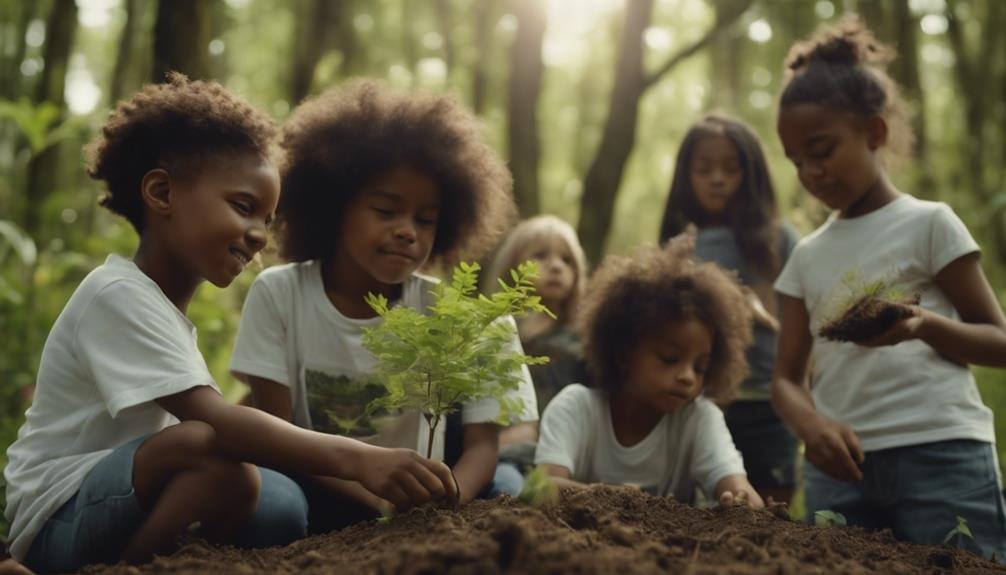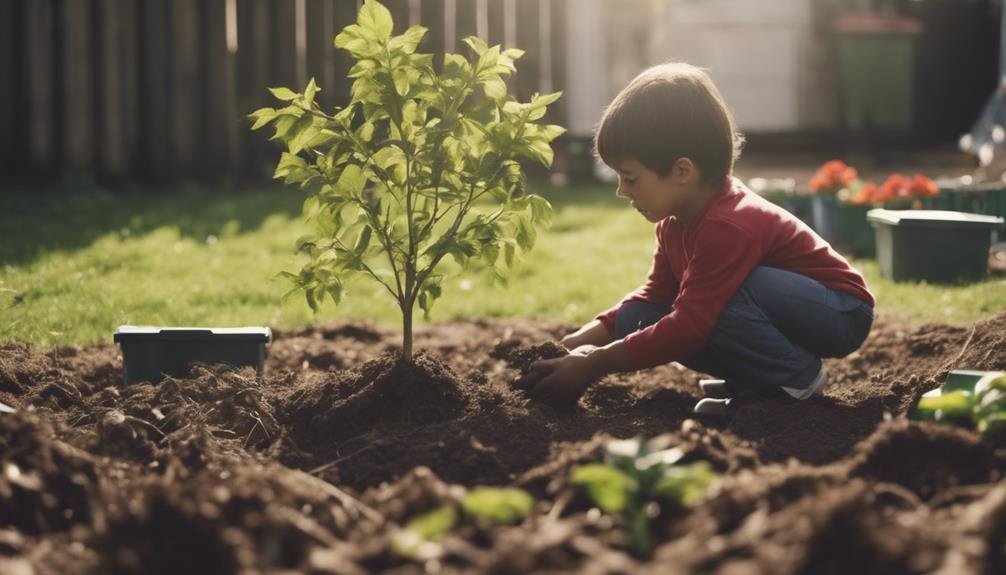"Cherishing Little Steps - A Haven for Baby and Family Journeys"
Teaching Children About Environmental Conservation
Imagine a world where the seeds of sustainability are sown early in the minds of the young.
As you ponder the impact of environmental conservation education on future generations, consider the pivotal role children play in shaping a greener tomorrow.
From hands-on activities that ignite curiosity to instilling eco-conscious behaviors, there are numerous ways to foster a love for nature in kids.
But how can we guarantee these lessons translate into real-world action and meaningful change?
Key Takeaways
- Environmental education instills stewardship in children for a sustainable future.
- Engaging activities like nature crafts and scavenger hunts connect kids with nature.
- Teaching sustainable practices nurtures eco-friendly habits in young minds.
- Exploring nature with children fosters curiosity, respect, and appreciation for the environment.
Importance of Environmental Conservation Education

Understanding the importance of environmental conservation education is essential for fostering a sustainable future for our planet. By raising awareness and fostering stewardship, this education instills values that promote action. As a parent or educator, you play a vital role in shaping young minds to care for the environment. Through education, children learn the significance of protecting our planet's resources and biodiversity.
By incorporating environmental lessons into daily activities, you can help children develop a sense of responsibility towards nature. Encouraging them to reduce, reuse, and recycle not only teaches practical skills but also cultivates a mindset of sustainability. When children understand the impact of their actions on the environment, they become empowered to make positive changes.
Environmental conservation education goes beyond facts and figures; it's about inspiring a generation of eco-conscious individuals who'll actively work towards preserving our planet for future generations. By instilling these values early on, you're nurturing a community of young environmental stewards who'll lead the way towards a greener, more sustainable world.
Engaging Activities for Kids
Looking for fun and educational activities to engage kids in environmental conservation? Nature crafts and outdoor games are fantastic ways to connect children with nature while teaching them about the importance of conservation.
Nature crafts like creating bird feeders from recycled materials or making plantable seed paper not only encourage creativity but also highlight the significance of reusing and recycling items. These hands-on activities show kids how they can contribute to protecting the environment through simple yet impactful actions.
Outdoor games are another engaging way to educate children about environmental conservation. Games like nature scavenger hunts, where kids search for specific plants or animals, help them learn about biodiversity and the interconnectedness of ecosystems. Additionally, activities like tree planting or organizing a community clean-up teach children about environmental stewardship and the positive impact of their actions on the environment.
Teaching Sustainable Practices

To instill sustainable practices in children, encourage them to adopt eco-friendly habits in their daily routines. Introducing them to recycling games can make learning about sustainability fun and interactive. Consider organizing outdoor adventures where they can appreciate nature and understand the importance of conservation firsthand. Engage children in green crafts to spark creativity while emphasizing the use of recycled materials.
Gardening activities can be another excellent way to teach kids about sustainability by showing them how to care for plants and the environment. By involving them in planting fruits or vegetables, they learn the value of reducing waste and consuming locally grown produce.
These hands-on experiences not only educate children about environmental conservation but also foster a sense of responsibility towards the planet. As they participate in these sustainable practices, they develop a deeper connection with nature and become more mindful of their impact on the environment. Encouraging these habits from a young age sets a strong foundation for a lifetime of eco-conscious choices.
Exploring Nature With Children
Begin on nature excursions with your children to cultivate their curiosity and appreciation for the environment. Nature walks and outdoor exploration provide invaluable opportunities for learning and bonding with nature. Here are some tips to make the most out of these experiences:
- Choose Diverse Locations: Explore different environments like forests, beaches, or parks to expose children to a variety of ecosystems and wildlife.
- Encourage Observation: Teach your children to observe their surroundings closely, noticing details like the shapes of leaves, animal tracks, or bird songs.
- Interactive Activities: Engage in fun activities such as scavenger hunts, identifying plants and animals, or collecting leaves and rocks to spark their interest.
- Leave No Trace: Teach children the importance of respecting nature by leaving it as they found it, emphasizing the significance of conservation and preservation.
Inspiring Eco-Friendly Habits

To cultivate a sustainable lifestyle with your children, instill eco-friendly habits that prioritize conservation and environmental stewardship. Green living isn't just a trend; it's a way of life that benefits the planet and future generations.
Encourage eco-conscious choices like reducing waste by using reusable items, recycling materials, and composting organic waste. Teach your children the importance of conserving water by turning off taps when not in use and fixing leaks promptly.
Engage your family in energy-saving practices such as turning off lights and unplugging electronics when not in use. Show them how to save energy by adjusting thermostats and using natural light during the day.
Inspire them to appreciate nature by spending time outdoors, planting trees, and creating wildlife-friendly spaces in your backyard. By making these small changes, you aren't only teaching your children about environmental conservation but also empowering them to be stewards of the earth.
Together, your family can make a meaningful impact through these eco-friendly habits.
Empowering Youth for Change
Empowering young individuals to be catalysts for positive change in environmental conservation starts with fostering a deep sense of connection to the natural world. When it comes to youth leadership in environmental advocacy, here are four key ways to inspire and empower the next generation to make a difference:
- Education: Encourage young people to learn about environmental issues and their impact on the planet. Knowledge is a powerful tool for driving change.
- Support: Provide mentorship and support to youth who are passionate about environmental conservation. Show them that their voices matter and can create a meaningful impact.
- Action: Empower young individuals to take action in their communities, whether it's organizing clean-up events, advocating for policy changes, or raising awareness through social media.
- Networking: Connect young environmental advocates with like-minded peers and organizations. Building a strong network can amplify their efforts and create a sense of belonging in the larger conservation community.
Frequently Asked Questions
How Can Parents Incorporate Environmental Conservation Education Into Everyday Routines at Home?
To incorporate environmental conservation education into everyday routines at home, you can engage in outdoor activities for hands-on learning. Have family discussions about it and make it a part of your daily habits. It's important and impactful!
Are There Any Specific Resources or Tools Available for Teaching Children About the Impact of Climate Change on the Environment?
Explore interactive games and online videos to help kids grasp the impact of climate change. These resources engage young minds, making complex topics accessible and fostering a sense of environmental stewardship from an early age.
What Are Some Strategies for Addressing Skepticism or Resistance to Environmental Conservation Education in Children?
When addressing skepticism or resistance in kids, acknowledge their concerns, encourage questions, share relatable stories, and provide hands-on experiences. Engage them in fun activities, show real-world impacts, and empower them to make a difference.
How Can Educators Ensure That the Lessons on Environmental Conservation Are Age-Appropriate and Engaging for Children of All Ages?
Hey there! When planning lessons on environmental conservation for kids, it's important to tailor activities to their age and interests. Incorporate engaging learning techniques like hands-on experiments, interactive games, and storytelling to make the lessons memorable and impactful.
Are There Any Long-Term Studies or Research That Showcase the Effectiveness of Teaching Children About Environmental Conservation at a Young Age?
Explore various case studies and long-term research that highlight the effectiveness of introducing children to environmental conservation early on. Witness the positive impact of integrating such education into children's learning journey for a sustainable future.
Conclusion
As you teach children about environmental conservation, you may worry about the challenges they'll face in the future. But remember, every small action they take today, like planting a tree or picking up litter, is a step towards a brighter tomorrow.
Keep nurturing their love for nature, and watch as they bloom into eco-warriors who'll protect our planet with passion and determination.
Together, we can create a greener, cleaner world for generations to come.


